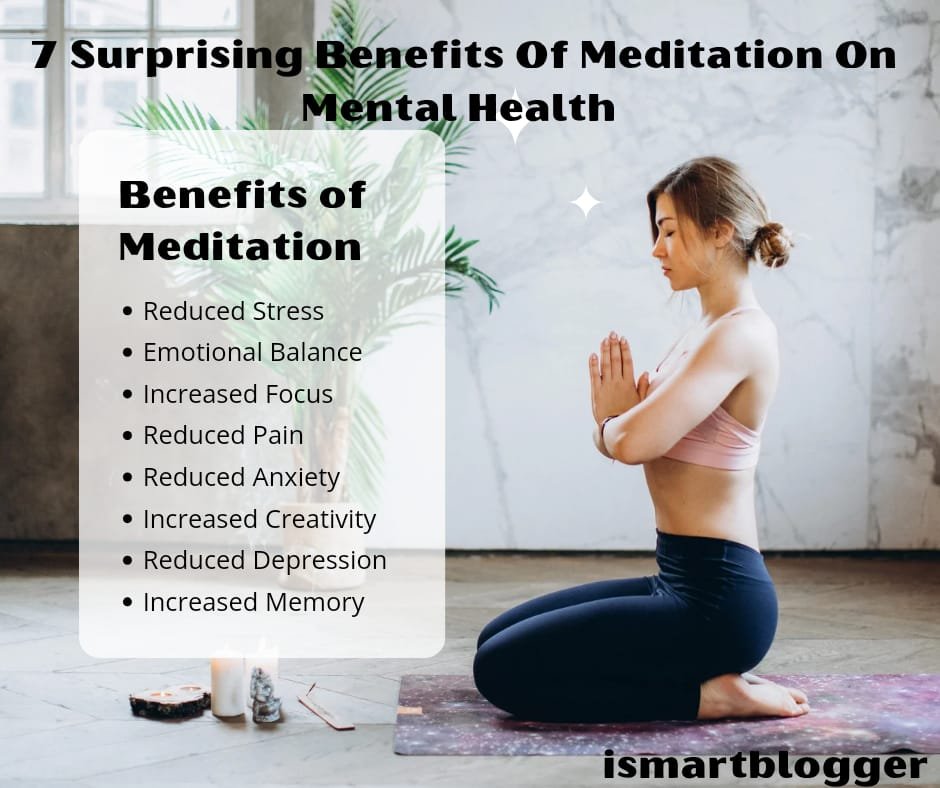Embark on a journey exploring the unexpected advantages of meditation on mental health. Beyond its renowned stress-relieving attributes, meditation offers surprising benefits, from enhancing focus and memory to promoting sound sleep. This ancient practice improves emotional well-being, reduces depression symptoms, and even lowers blood pressure. Whether you’re a novice or seasoned practitioner, various meditation styles suit individual preferences. Starting slow and finding a comfortable, quiet space, you can begin with mindfulness, loving-kindness, or body scan meditation. With consistent practice, even a few minutes daily, you can experience mental and physical well-being improvements. Discover the transformative power of meditation and its diverse array of health advantages.
Meditation is an ancient practice that has gained popularity in recent years due to its numerous benefits on mental health. While meditation is commonly known to improve relaxation and reduce stress, there are also several surprising benefits of meditation that many people may not be aware of. In this article, we will explore 7 surprising benefits of meditation on mental health.
Reduces Stress and Anxiety:
One of the most commonly known benefits of meditation is its ability to reduce stress and anxiety. Meditation helps to reduce the levels of cortisol, the stress hormone, in the body. This reduction in cortisol levels leads to a decrease in anxiety symptoms. Moreover, practicing meditation regularly can help individuals to better manage their stress levels, leading to a more relaxed and calm state of mind.
Improves Focus and Attention:
Another surprising benefit of meditation is its ability to improve focus and attention span. Regular meditation practice has been shown to increase grey matter in the brain, which is responsible for cognitive function. As a result, individuals who practice meditation regularly are better able to concentrate and focus on their tasks, leading to increased productivity and effectiveness.
Enhances Emotional Well-being:
Meditation can also enhance emotional well-being. By practicing meditation, individuals can improve their emotional regulation, which means they are better able to manage difficult emotions such as anger and sadness. Meditation can also help individuals to develop a more positive outlook on life, leading to improved mood and overall well-being.
Boosts Memory and Learning:
Meditation has been shown to boost memory and enhance learning ability. Regular meditation practice can increase neuroplasticity, which is the brain’s ability to change and adapt over time. This increased neuroplasticity leads to improved memory retention and learning ability.
Promotes Better Sleep:
Meditation can also promote better sleep. By helping individuals to relax and reduce racing thoughts, meditation can improve sleep quality and duration. Regular meditation practice can also help individuals to develop a more consistent sleep routine, leading to improved overall sleep habits.
Reduces Symptoms of Depression:
Meditation can be an effective complementary therapy for individuals struggling with depression. Studies have shown that mindfulness-based interventions, such as meditation, can reduce symptoms of depression and improve overall well-being. Meditation can also help individuals to develop a more positive outlook on life, leading to increased motivation and a greater sense of purpose.
Lowers Blood Pressure:
Regular meditation practice has been shown to help lower blood pressure. This is because meditation helps to reduce stress and promote relaxation, which can have a positive effect on cardiovascular health. By lowering blood pressure, individuals who practice meditation regularly can reduce their risk of developing cardiovascular disease.
Conclusion:
There are several surprising benefits of meditation on mental health. From reducing stress and anxiety to boosting memory and improving sleep, regular meditation practice can have a significant positive impact on overall well-being. Whether you are new to meditation or an experienced practitioner, there are many resources available to help you incorporate meditation into your daily routine. So why not give it a try and see for yourself the positive effects that meditation can have on your mental health?
If you are new to meditation, it’s important to start slowly and build up your practice gradually. There are many different types of meditation, so it’s important to find a style that works for you. Some popular meditation techniques include mindfulness meditation, which involves focusing on the present moment and observing your thoughts without judgment; loving-kindness meditation, which involves cultivating feelings of love and compassion towards yourself and others; and body scan meditation, which involves bringing your attention to different parts of your body to promote relaxation.
To start your meditation practice, find a quiet and comfortable place where you can sit or lie down without being disturbed. Close your eyes and focus on your breath, noticing the sensation of the air moving in and out of your body. If your mind begins to wander, gently bring your attention back to your breath. Try to do this for 5-10 minutes each day, gradually increasing the length of your practice as you become more comfortable.
If you find it difficult to meditate on your own, there are many guided meditation apps and videos available that can help you get started. These resources provide step-by-step instructions and can be a helpful way to stay motivated and focused.
In addition to the mental health benefits, meditation can also have physical health benefits. For example, meditation has been shown to lower blood pressure, reduce chronic pain, and boost the immune system. By incorporating meditation into your daily routine, you can improve both your mental and physical well-being.





